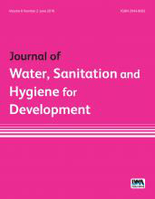
Journal of Water Sanitation and Hygiene for Development
Scope & Guideline
Driving impactful research at the intersection of water and health.
Introduction
Aims and Scopes
- Water Quality and Treatment:
Research on methodologies and technologies for improving water quality, including treatment processes and the microbial safety of drinking water. - Sanitation Practices and Innovations:
Exploration of new sanitation technologies and practices, including waste management solutions, sanitation infrastructure, and community-led initiatives. - Hygiene Promotion and Behavior Change:
Studies focused on hygiene practices, behavior change interventions, and their impacts on public health, particularly in vulnerable populations. - Equity and Access to WASH Services:
Investigating disparities in access to water, sanitation, and hygiene services, especially among marginalized communities and in low-income settings. - Impact of Environmental Factors on WASH:
Assessing how environmental changes, climate, and disasters affect water and sanitation services and the health of communities. - Policy and Governance in WASH:
Analysis of policies, governance structures, and institutional frameworks that influence the delivery and sustainability of WASH services.
Trending and Emerging
- Menstrual Hygiene Management (MHM):
There is an increasing focus on MHM, addressing the unique needs of women and girls and the importance of sanitary facilities in schools and public spaces as a critical aspect of WASH. - Behavioral Insights and Community Engagement:
An emphasis on understanding behavioral determinants and community engagement strategies to improve WASH practices, indicating a shift towards participatory research. - Linkages Between WASH and Public Health:
Research is increasingly exploring the connections between WASH services and broader health outcomes, particularly in the context of infectious diseases and malnutrition. - Innovative Wastewater Treatment Technologies:
Emerging studies on novel treatment technologies, including nature-based solutions and decentralized systems, are gaining traction as sustainable options for wastewater management. - Impact of Climate Change on WASH:
Growing concern about how climate change affects water availability, sanitation infrastructure, and hygiene practices, reflecting the need for adaptive strategies. - Data-Driven Decision Making:
The rise of data analytics and modeling approaches in evaluating WASH interventions and outcomes, showcasing a trend towards evidence-based policymaking.
Declining or Waning
- Traditional Water Supply Infrastructure:
There is a noticeable decrease in papers focusing on traditional water supply systems, as research increasingly shifts towards innovative and sustainable solutions. - General Surveys of WASH Conditions:
Older methodologies relying solely on generalized surveys without in-depth qualitative analysis are becoming less frequent, with a preference for more nuanced, context-specific studies. - Single-Factor Studies:
Research focusing exclusively on single factors affecting WASH outcomes (e.g., only water quality without considering socioeconomic or behavioral aspects) is declining in favor of more integrated approaches. - Global North WASH Studies:
The focus on WASH issues in high-income countries is decreasing, as the journal increasingly emphasizes challenges faced in low- and middle-income countries.
Similar Journals

Water Reuse
Fostering Collaboration for Global Water Sustainability.Water Reuse is a pioneering journal dedicated to advancing the field of water science and technology, particularly focusing on innovations in water recycling and reuse strategies. Published by IWA Publishing in the United Kingdom, this journal has quickly established itself as a vital resource for researchers, professionals, and students engaged in sustainable water management practices. With an impressive impact factor and a ranking that places it in the top quartile for both Water Science and Technology and Filtration and Separation, Water Reuse offers an open-access platform that fosters the dissemination of high-quality research. Since its inception in 2021, it has garnered attention for its commitment to addressing critical global challenges related to water scarcity and environmental sustainability. The journal provides a crucial forum for the exchange of knowledge and best practices, contributing significantly to the advancement of water reuse methodologies. By encouraging interdisciplinary collaboration and the publication of pioneering studies, Water Reuse is poised to play a central role in shaping the future of water management.

Brazilian Journal of Hygiene and Animal Sanity
Advancing animal health for a safer tomorrow.Brazilian Journal of Hygiene and Animal Sanity is an esteemed academic publication dedicated to advancing the fields of veterinary science, animal health, and public health in Brazil and beyond. Published by UNIV FEDERAL CEARA, CENTRO CIENCIAS AGRARIAS, this journal serves as a vital resource for researchers, professionals, and students, providing peer-reviewed articles that explore critical issues related to hygiene practices, disease prevention, and animal welfare. With an ISSN of 1981-2965, the journal prioritizes the dissemination of innovative research findings and methodologies, aiming to impact the quality of life for both animals and humans significantly. Although currently not an Open Access journal, it continues to seek partnerships that will enhance its reach and accessibility. Situated in Fortaleza, Brazil, the journal is poised to become a cornerstone for those engaged in the study and improvement of zoonotic diseases and sanitation practices, reflecting the essential intersection of animal health and public wellbeing.

Infection Prevention in Practice
Empowering practitioners with cutting-edge infection control research.Infection Prevention in Practice is a leading academic journal published by ELSEVIER that has established itself as a vital resource in the domains of Infectious Diseases and Public Health. With its Open Access policy implemented since 2019, the journal enhances global accessibility to cutting-edge research and practical insights aiming to reduce the risk of infections in various settings. It proudly holds a Q3 ranking in Infectious Diseases and a Q2 ranking in Public Health, Environmental and Occupational Health as of 2023, showcasing its impact and relevance within the scientific community—particularly with a Scopus rank placing it in the 71st percentile for public health research. Its scope includes the latest advancements, strategies, and practices in infection prevention, making it an indispensable read for researchers, healthcare professionals, and students dedicated to improving health outcomes and combating infectious diseases effectively. The journal operates from its base in the United Kingdom and reaches a global audience, fostering collaboration and innovation in infection control practices.

GMS Hygiene and Infection Control
Elevating hygiene standards through scholarly discourse.GMS Hygiene and Infection Control is a leading open access journal dedicated to advancing knowledge and research in the fields of hygiene, infection control, and public health. Published by GERMAN MEDICAL SCIENCE-GMS, this journal has been offering unrestricted access to its rich repository of scholarly articles since 2013, making significant contributions to the global discourse on infection prevention and control strategies. With its commitment to promoting high-quality research, GMS Hygiene and Infection Control is a vital resource for researchers, healthcare professionals, and students engaged in the pursuit of best practices for improving health outcomes. The journal is built upon a foundation of rigorous peer review and aims to disseminate innovative findings that address current challenges in hygiene and infection control, thereby enhancing clinical practices and public health policies worldwide.
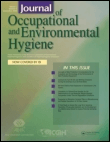
JOURNAL OF OCCUPATIONAL AND ENVIRONMENTAL HYGIENE
Enhancing Public Health Through Rigorous ResearchJOURNAL OF OCCUPATIONAL AND ENVIRONMENTAL HYGIENE is a leading publication within the fields of Occupational and Environmental Health, dedicated to advancing the understanding and practice of hygiene in various workplaces and environments. Published by Taylor & Francis Inc, this journal is committed to disseminating high-quality research and reviews that address critical issues affecting public health and occupational safety. With an Impact Factor that situates it in the Q3 quartile of 2023 in both Public Health and Environmental and Occupational Health categories, the journal ranks at #309 out of 665 in its field according to Scopus, demonstrating its relevance and influence among peers. The journal accepts articles that contribute to the scientific discourse on the intersection of work environments and health outcomes, further fostering interdisciplinary collaboration. Operating on an open-access model, the JOURNAL OF OCCUPATIONAL AND ENVIRONMENTAL HYGIENE ensures that vital research is accessible to professionals, policymakers, and students alike, supporting the global endeavor of enhancing health and safety standards across diverse sectors. Explore the latest advancements and innovative studies through this impactful platform.

E-Water
Advancing the Future of Water ManagementE-Water, published by the European Water Association, is a leading academic journal focused on the multifaceted field of water resource management and environmental sustainability. With the ISSN 1994-8549, this journal serves as a vital platform for researchers, professionals, and students dedicated to advancing knowledge in water science and related areas. Although currently not an Open Access journal, E-Water provides in-depth peer-reviewed articles, ensuring high-quality research dissemination. The journal is committed to showcasing innovative studies on water quality, conservation, and policy-making, making significant contributions to the field of water management both locally and globally. As water scarcity and environmental challenges continue to rise, E-Water stands as an essential resource for those involved in the stewardship of our most vital natural resource.
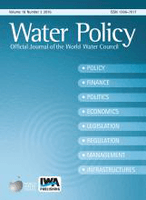
Water Policy
Bridging the gap between research and real-world water solutions.Water Policy is a leading academic journal published by IWA PUBLISHING, dedicated to advancing the understanding of water management and policy across various disciplines. With a focus on the intricacies of water governance, the journal fosters dialogue among researchers and practitioners by presenting innovative studies and comprehensive analyses. Since transitioning to an Open Access model in 2021, it has increased accessibility to critical research, allowing for a broader reach and greater impact within the water sector. The journal's reputation is underscored by its classification in Q2 and Q3 quartiles in fields such as Geography, Planning and Development, as well as Environmental Science disciplines, marking it as a valuable resource for scholars and policymakers alike. The ISSN 1366-7017 and E-ISSN 1996-9759 facilitate streamlined access to its extensive archive, encouraging wider engagement in pivotal discussions surrounding sustainable water practices. With a commitment to shaping the future of water governance, Water Policy stands as an essential platform for sharing vital research and perspectives that contribute to effective water management globally.
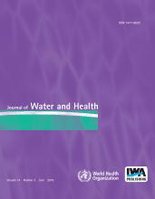
JOURNAL OF WATER AND HEALTH
Transforming water insights into impactful health solutions.The JOURNAL OF WATER AND HEALTH, published by IWA PUBLISHING, serves as a leading platform for disseminating innovative research related to water quality, sanitation, and public health. With its ISSN 1477-8920 and E-ISSN 1996-7829, this esteemed journal significantly contributes to the fields of Public Health, Environmental Science, and Microbiology, as evidenced by its robust rankings in several quartiles, including Q2 in Public Health and Water Science and Technology in 2023. This periodical enjoys a convergence of years from 2003 to 2024, underscoring its continuous relevance in addressing critical global issues such as water safety and infectious diseases. Although not an open-access journal, the insights and findings presented are pivotal for researchers, professionals, and students eager to contribute to the sustainable management of water resources and health improvements worldwide.
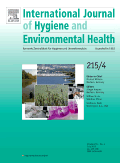
INTERNATIONAL JOURNAL OF HYGIENE AND ENVIRONMENTAL HEALTH
Exploring critical insights in public health and environmental safety.International Journal of Hygiene and Environmental Health, published by Elsevier GmbH, stands at the forefront of research in the fields of public health, environmental, and occupational health. With an impressive impact factor that underscores its significance—ranking #30 out of 665 journals in its category, placing it within the top 5%—the journal is a vital resource for academics and professionals seeking to expand their knowledge and contribute to advancements in the field. Since its inception in 2000, the journal has continually evolved, with its Q1 quartile designation reflecting its high-quality contributions and rigorous peer-review process. Accessible to a global audience, it offers flexible open access options, promoting the dissemination of critical findings on hygiene and environmental health issues. Published in Germany, the journal serves as an essential platform for researchers, educators, and practitioners to share innovative studies, timely reviews, and insightful discussions, driving forward the dialogue on public health challenges and solutions in today's world.

Iranian Journal of Public Health
Innovating solutions for global health challenges.Iranian Journal of Public Health is a premier publication dedicated to advancing the field of public health research. Established in 2001 and published by the Iranian Scientific Society Medical Entomology, this Open Access journal provides an invaluable platform for disseminating innovative findings and practices aimed at addressing public health challenges both locally and globally. With its roots tracing back to 1973, the journal has evolved through multiple converged years, reflecting a rich history of commitment to the health sciences. Currently categorized in Q3 within Public Health, Environmental, and Occupational Health, as per the 2023 rankings, it ranks 406 out of 665 in the Scopus database, placing it in the 39th percentile. This significant positioning underscores its role in fostering high-quality research that informs policy and enhances community health outcomes. The editorial team is dedicated to upholding rigorous academic standards while embracing diverse perspectives that resonate within the dynamic landscape of public health. It is an essential resource for researchers, professionals, and students alike, fostering collaborative efforts in the relentless pursuit of health equity and sustainability.